‘Carousel’ at Lyric Opera: The stars shine in this merry-go-round. Steven Pasquale is Billy Bigelow
“Carousel” by Richard Rodgers and Oscar Hammerstein, produced by the Lyric Opera of Chicago through May 3. Tune in for a radiocast, from opening night, on June 15, ★★★
By Nancy Malitz
The opening of this “Carousel” has everything going for it as the new Rob Ashford production lays out in the plainest way possible what a high-stakes risk your average town takes when the traveling circus rolls in.
To the tune of a dizzying musical prelude that would put any innocent young thing into a heightened state, the Lyric Opera of Chicago is set aswirl around a wordless pantomime: Handsome carney barker Billy Bigelow – every father’s nightmare – and scantily clad carnival owner Mrs. Mullin step out from her trailer together, for a mutual after-the-act smoke.
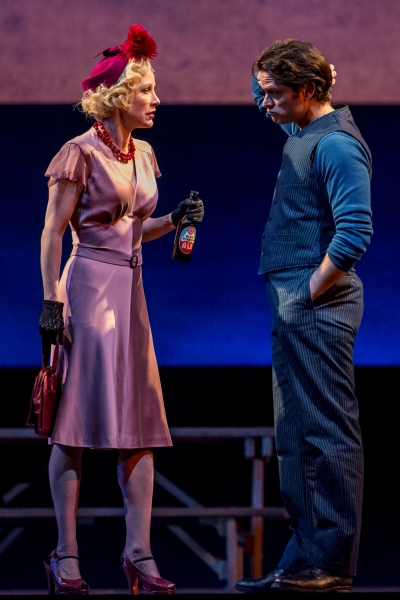 The best aspects of this effort — the third of five Rodgers and Hammerstein musicals abloom at the Lyric in successive springtime musical theater initiatives — are on display in those first few minutes. The show’s standout performers are Steven Pasquale in a breathtaking turn as a handsome young punk you want to root for in spite of yourself, and Charlotte d’Amboise, an extraordinary dancer and actor whose every move’s a marvel, as the long-limbed Mrs. Mullin, a tough-girl Roxie now worn into middle age, still a sucker for a fella.
The best aspects of this effort — the third of five Rodgers and Hammerstein musicals abloom at the Lyric in successive springtime musical theater initiatives — are on display in those first few minutes. The show’s standout performers are Steven Pasquale in a breathtaking turn as a handsome young punk you want to root for in spite of yourself, and Charlotte d’Amboise, an extraordinary dancer and actor whose every move’s a marvel, as the long-limbed Mrs. Mullin, a tough-girl Roxie now worn into middle age, still a sucker for a fella.
There is also the grand spectacle that the Lyric Opera itself offers. Just settle into that gilded deco marvel, the Civic Opera House, during those opening minutes when these two accomplished actors telegraph the show’s essential vibe, and you get a clear sense of what’s in store.
As the show fires up under conductor David Chase, a parade of swirling circus tents glides into view and their canvases lift to briefly peekaboo the wonders inside. These early minutes are indeed memorable, but subsequently the production tends toward theatrical letdown, despite a really wonderful barker in Pasquale’s Billy and some of the best music and lyrics that Richard Rodgers and Oscar Hammerstein ever wrote. “Carousel” is the story of nice girl Julie, who falls for the barker, who marries her and then proceeds to make a mess of both their lives.
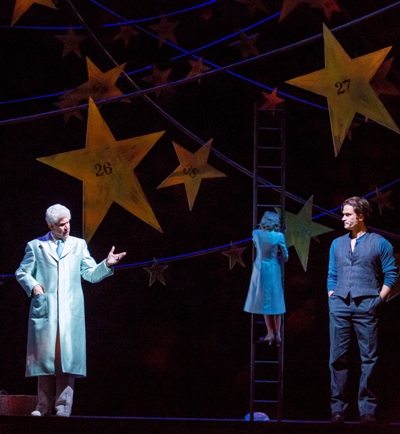 Of course, this being a Broadway show, Billy gets one of those feel-good Broadway-style pearly-gate interventions, or “mother of pearly-gate,” as longtime showbiz legend Tony Roberts puts it. (In a charming cameo appearance, the white-haired Roberts plays the starkeeper guarding heaven’s back door, which is where Billy eventually finds himself.)
Of course, this being a Broadway show, Billy gets one of those feel-good Broadway-style pearly-gate interventions, or “mother of pearly-gate,” as longtime showbiz legend Tony Roberts puts it. (In a charming cameo appearance, the white-haired Roberts plays the starkeeper guarding heaven’s back door, which is where Billy eventually finds himself.)
The sets are a bit of a disappointment. In updating the show from the late 19th-century New England to the depression era, Ashford went for strong-boned minimalism — the no-nonsense look befitting leather-skinned fishermen who face down the wind. The idea has obvious merit, but as it plays out on the spare sets by Paolo Ventura that all but remove the coastal feeling and the towering natural forces of storm and sea, the story loses its soft contours and fritters away its romantic sweep.
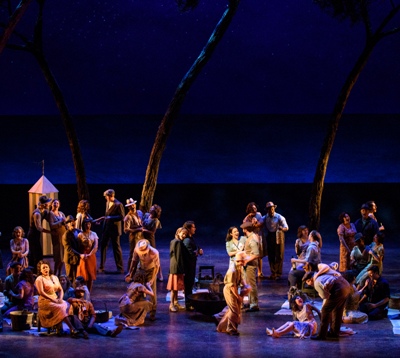 Was the problem in concept, or cost-cutting? Minimalism can be extravagantly bold onstage. But once the spectacular prancing horses glide in, the rest just becomes … minimal. We can get Broadway musicals done small in Chicago at other theaters. The Lyric’s opportunity is clear enough.
Was the problem in concept, or cost-cutting? Minimalism can be extravagantly bold onstage. But once the spectacular prancing horses glide in, the rest just becomes … minimal. We can get Broadway musicals done small in Chicago at other theaters. The Lyric’s opportunity is clear enough.
Broadway is famous for its dancing, and this show, choreographed originally by Agnes deMille, is one of those that set the modern standard. Ashford, who is also this production’s choreographer, took a bilateral approach its challenges.
On the one hand, he went full-out with the dance sequence that begins as Abigail Simon, who is heart-stopping as Billy’s daughter, the teenage Louise, is seen by us as Billy sees her, from a distance, mute, vulnerable, stigmatized, exquisitely alone in her misery.
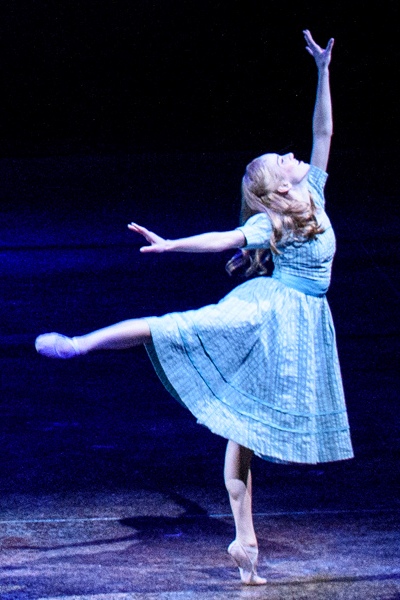 It is a memorable scene that opens out to involve more and more of the moments shaped by Billy’s failings. On the other hand, Ashford settled for a more herd-like approach to the ensemble’s songs and movements in other parts of the show, painting the people of the community in uniform, stylized strokes, which robbed overall texture. The clambake, sad to say it, was a dud.
It is a memorable scene that opens out to involve more and more of the moments shaped by Billy’s failings. On the other hand, Ashford settled for a more herd-like approach to the ensemble’s songs and movements in other parts of the show, painting the people of the community in uniform, stylized strokes, which robbed overall texture. The clambake, sad to say it, was a dud.
As for putting a Broadway star into an opera house, there’s probably as much a learning curve there as when you put an opera singer into a Broadway musical.
Jenn Gambatese, who sang Maria in “The Sound of Music” at the Lyric last year, is back this time around as Carrie Pipperidge, the comedic secondary lead who marries Enoch Snow (sweet-voiced tenor Matthew Hydzik) and proceeds to make little Snows left and right. Think of Carrie as Papagena, if you’re into Mozart operas. Gambatese has mastered the art of being understood whether singing, speaking or boo-hoo-hoo-ing in the cavernous space of the Civic, and she’s a perfect delight in this role.
 But I had difficulty understanding the words of Laura Osnes as Julie, the soft-hearted romantic who falls tragically for Billy. And if I didn’t know them already, I’m not sure I would have understood the actual words being sung by longtime international opera mezzo-soprano Denyce Graves as Nettie Fowler, the wise mother figure of the seaside community, and the one who gets to sing the show’s famous song “You’ll Never Walk Alone.” Osnes was all consonants, Graves all vowels. If they could trade a few, they might come out all right.
But I had difficulty understanding the words of Laura Osnes as Julie, the soft-hearted romantic who falls tragically for Billy. And if I didn’t know them already, I’m not sure I would have understood the actual words being sung by longtime international opera mezzo-soprano Denyce Graves as Nettie Fowler, the wise mother figure of the seaside community, and the one who gets to sing the show’s famous song “You’ll Never Walk Alone.” Osnes was all consonants, Graves all vowels. If they could trade a few, they might come out all right.
Then again, maybe Graves is holding her consonants for ransom. That would be justified. I can’t believe the creative team chose not to light the celebrated diva’s face when she sang “You’ll Never Walk Alone” as Billy lies dying and Julie, distraught, leans over him. Nettie’s song is a tragic highpoint of the second act, and it does seem criminal that the light shines more brightly on Julie and Billy, who is dead. It should be Nettie’s moment. There is plenty of time to get back to Julie and to Billy. He gets several more scenes, altogether a rather splendid afterlife in which he gets to sing about coming before the highest judge of all and otherwise milk our forgiving hearts.
Osnes was impressive in the first scene, when she appears as a slip of a girl on the brink of womanhood, clearly shy but helplessly infatuated by Billy from her first glimpse of him. As a singer Osnes has done some lovely things on Broadway, including the title role in the Rodgers and Hammerstein “Cinderella,” but on opening night her delivery of “If I Loved You” seemed downright mannered. She clipped her “if’s” with silence almost before she got the words out, and otherwise she rarely projected fully. I had trouble finding her face. Her characteristic brand of intensity, at its most extreme, was to whisper chokingly, inwardly. That might work, but only if she figures how to reach the last row with it.
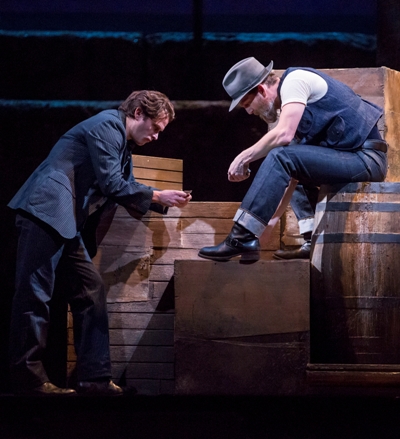 Pasquale’s Billy, however, was the total package. His big scenes, the duet in which he falls in love with Julie, and the extraordinary second act soliloquy in which he realizes he’s going to have to be a father for his unborn daughter, were as good as they can be. It was obvious that his vocal performance was deeply satisfying to the opera lovers in the crowd, who gave him an old-fashioned, prolonged, cheering and whistling ovation. It’s a difficult thing to make us care for, and come to understand, a man who is both a criminal and an abuser. But as we see him getting led down a dark path by Jigger (Jarrod Emick, wonderful as an even wilier bad guy), we come to sympathize.
Pasquale’s Billy, however, was the total package. His big scenes, the duet in which he falls in love with Julie, and the extraordinary second act soliloquy in which he realizes he’s going to have to be a father for his unborn daughter, were as good as they can be. It was obvious that his vocal performance was deeply satisfying to the opera lovers in the crowd, who gave him an old-fashioned, prolonged, cheering and whistling ovation. It’s a difficult thing to make us care for, and come to understand, a man who is both a criminal and an abuser. But as we see him getting led down a dark path by Jigger (Jarrod Emick, wonderful as an even wilier bad guy), we come to sympathize.
Related Links:
- Performance location, dates and times: Go to TheatreinChicago.com
- Broadway, Opera Joing in Lyric’s “Sound of Music”: Read it at ClassicalVoiceAmerica.org
- Review of “The Sound of Music”: Read it at ChicagoOntheAisle.com
- Review of “Oklahoma”: Read it at ChicagoOntheAisle.com

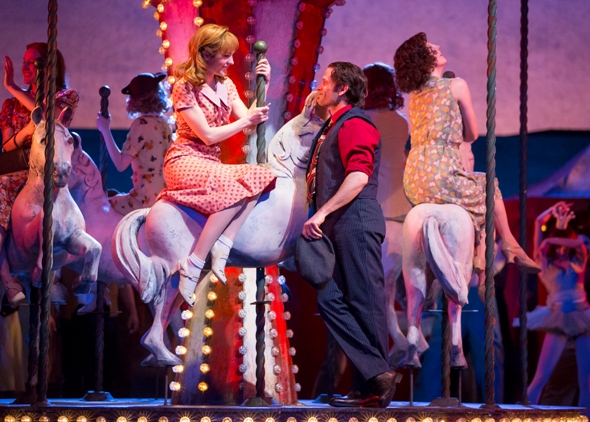


I see maybe more theater than critics even do & am having a very amusing night of reading the various reviews here (theatreinchicago.com ….the bible for any serious Chgo theater goer) where these studied critics all contradict each other. Last review sang highest praises for Julie and basically unjustly bashed Billy (the actor, for holding back). Here we read the opposite.
Well let me weigh in as a rather avid, committed & professional theater goer & state this was simply extraordinary. Just stunning from opening to closing scene. It’s my favorite musical score of all time (how can it NOT be), so you can accuse me of being biased but truly, that has no bearing. This production’s just plain flawless. Soaring. Think Jones’ review captured it best.
I would go so far as to say this is likely the most visceral Carousel I’ve seen to date (and it’s true, I do not miss it when playing anywhere I can manage getting to. And fortunately I get around to see great theater everywhere here in Chgo & even NY when I can).
I don’t think the critics can manage writing reviews without finding fault somewhere because then maybe they fear it’s not being viewed “critically”—that is all just my guess. And truly a shame. Give credit where credit is due & try to NOT invent detractions in attempt to make yourself appear more worthy of your status. Trust when I say it doesn’t help you any, only hurts.
I see maybe more theater than critics even do & am having a very amusing night of reading the various reviews here (theatreinchicago.com ….the bible for any serious Chgo theater goer) where these studied critics all contradict each other. Last review sang highest praises for Julie and basically unjustly bashed Billy (the actor, for holding back). Here we read the opposite.
Well let me weigh in as a rather avid, committed & professional theater goer & state this was simply extraordinary. Just stunning from opening to closing scene. It’s my favorite musical score of all time (how can it NOT be), so you can accuse me of being biased but truly, that has no bearing. This production’s just plain flawless. Soaring. Think Jones’ review captured it best.
I would go so far as to say this is likely the most visceral Carousel I’ve seen to date (and it’s true, I do not miss it when playing anywhere I can manage getting to. And fortunately I get around to see great theater everywhere here in Chgo & even NY when I can).
I don’t think the critics can manage writing reviews without finding fault somewhere because then maybe they fear it’s not being viewed “critically”—that is all just my guess. And truly a shame. Give credit where credit is due & try to NOT invent detractions in attempt to make yourself appear more worthy of your status. Trust when I say it doesn’t help you any, only hurts.